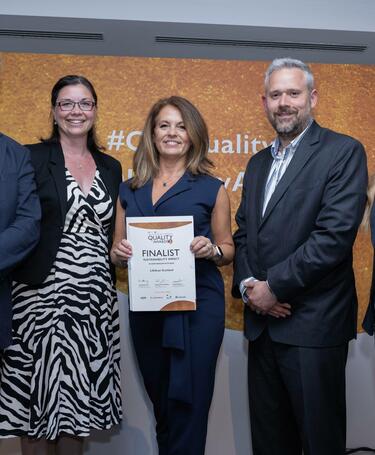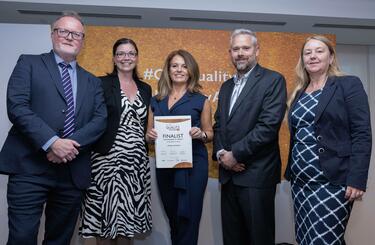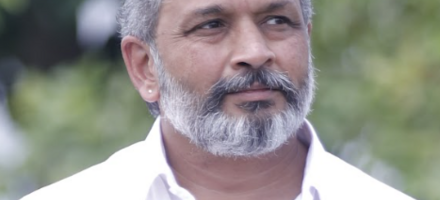
Making a lasting impact on sustainability
Progress indicator

LifeScan Scotland was among the finalists at the International Quality Awards (IQA) 2023 in the Sustainability Impact category, with the organisation’s ONEarth team praised by the judges for its work on a range of sustainability issues.
As a leading supplier, manufacturer and distributor of products and services that enable glucose monitoring and diabetes management, LifeScan Scotland, based in Inverness, has wellbeing at its heart. This extends not only to the high quality of its products, but also to the organisation’s own environmental impact and the health and wellbeing of its team.
This has led to a two-pronged approach to the organisation’s sustainability activities, which focus on issues around environment, social and governance (ESG), and equity, diversity and inclusion (EDI).
As explained during LifeScan Scotland’s interview with the IQA judges, the organisation has been working on sustainability initiatives for a number of years. However, in 2019, as part of its ISO 14001:2015 Environmental management systems – Requirements for use certification, the business did a thorough review of its aspects and impacts to evaluate the environmental impact of its manufacturing plant in Inverness and the company’s value chain.
This Environmental Aspects and Impacts Assessment, carried out with consultants Mabbett, identified specific areas of high impact in the business, which can be mapped against the UN’s Sustainable Development Goals (SDGs). They were:
- Distribution transport (SDG 13: Climate action;
- Waste from production and end of life (SDG 12: Responsible consumption and production);
- Energy consumption in production (SDG 12: Responsible consumption and production).
The review gave LifeScan a strong set of data from which it could make firm goals, actions and continuous data analysis commitments to the business. It could then develop a sustainability roadmap for both ESG and EDI aspects of the organisation.
The roadmap led to the development of several initiatives and actions, which again can be mapped against the UN’s SDGs:
- Creation of the ONEarth Team, an employee-led environmental community group;
- Sustainability survey, including a commuting and working-from-home employee questionnaire;
- Sustainability bootcamps – workshops and focus groups.
These initiatives were all part of a drive to reduce energy consumption and waste production; engage with employees and suppliers to use their knowledge to drive positive change; to understand the organisation’s baseline; and to provide a forum for discussion and engagement.
As part of the review, the organisation examined its baselines and targets, and at how data was captured to ensure its accuracy.
LifeScan Scotland then developed three pillars – its ‘2030 Ambitions’ – namely:
- zero waste;
- net zero greenhouse gas emissions;
- equality and protection of human rights.
Between 2010 and 2017, the organisation worked to achieve significant reductions in its use of gas and electricity through changes to existing plant and equipment at the manufacturing facility in Inverness. Having achieved a reduction of 7% in gas and 38% in electricity by 2017, these figures were used as the baseline for mapping further progress.
Once established, the ONEarth Team was tasked with delivering on activities involving climate and environmental, including identifying corporate social responsibility (CSR) opportunities, and encouraging new ideas and ways of thinking.
Other working groups developed include: Healthy Working Lives to help with employee wellbeing; Openness, to focus on diversity and inclusion; CSR sustainable work; STEM events; and LifeScan’s products.
"LifeScan’s passion really came through the submission and particularly the presentation. The team all are long-serving employees and are invested in making a real impact and achieving continual improvement."
Driving continuous improvement
LifeScan’s quality management system (QMS) is central to everything the organisation does, including all process improvements. The business has a robust process design and development validation (PDDV) process that is used to fully assess any change or improvement, before suggesting a controlled pathway to implement an adjustment, to mitigate any risks.
During the organisation’s sustainability journey, this PDDV has played a key role in ensuring that sustainability is at the heart of LifeScan’s values and cultures – a part of meeting the needs of customers, stakeholders and the local community.
To help ensure the success of its sustainability initiatives, the organisation has 12 sustainability champions across the business, and support and engagement is available for any employee who wants to generate improvements in their area.
As part of its supplier assessment, LifeScan has developed a sustainability questionnaire that is used when visiting a new site to gauge the environmental or social impact, as well as engaging regularly with established suppliers on the same issues.
The work being done in this area is highlighted by some of the sustainability initiatives implemented by the Supplier Quality team. These include:
- Using sustainable packaging materials, reducing plastic banding by 42%;
- Reusable packaging, saving more than 20 tonnes of materials per year;
- FSC logo compliance and application;
- Investigation into shelf life of several raw materials, saving 21 tonnes of PET;
- Removing more than 10,000 pieces of single-use plastics from laboratories by introducing glass bottles and metal weighing bowls that can be washed and re-used;
- Sample size reductions – carton samples have been reduced from 1,200 per batch to just 32.
LifeScan has also set in place a successful system whereby people working in the manufacturing plant can identify and raise emerging problems with waste or energy consumption, and see those issues fixed.
Other successful initiatives include the deployment of Smartsheets, a way of inputting and tracking live data across the organisation. All automated metering and targeting (AMT) data is collated monthly and transferred to the Smartsheet, which means that changes can be tracked easily and accurately for impact, so the business can evidence tangible improvements in key metrics.
Lessons learned
LifeScan Scotland has been on its sustainability journey for some time now and, unsurprisingly, has accrued plenty of wisdom along the way. Perhaps the biggest lesson learned is that change cannot happen overnight, especially in such a strictly regulated industry. However, the organisation has proved that once changes are instigated, significant results follow.
Away from manufacturing and products, the business has also made a big impact in the local community, taking part in activities such as beach cleaning and clearing local areas of rubbish.
Even seemingly small initiatives can have a big impact: the introduction of a box of litter-picking gloves at the organisation’s reception means employees can now safely collect litter while on a lunchtime walk, or even during the occasional walking meeting.
Aimi Lawrie, Principal Quality Engineer at LifeScan Scotland, summed up the organisation’s sustainability journey, saying: "For us, sustainability is not just about this (IQA) competition; it really has been our journey for more than two decades.
"Sustainability is the long-term health of LifeScan, it is understanding the strategies to put in place, and how we will survive and thrive to provide products for people and services to our current and future customers, while at the same maintaining a really happy and healthy workforce; supporting our local communities in the north of Scotland. It is embedded in our hearts, a part of our culture, and has been for a long time."
Judges comments
The LifeScan Scotland team were finalists at this International Quality Awards 2023. The judges said: "There was unmistakable evidence of the involvement of the organisation’s people, and of a genuine commitment towards sustainability. Very many activities and initiatives were described, which together have helped LifeScan Scotland address its key environmental impacts.
"LifeScan’s passion really came through the submission and particularly the presentation. The team all are long-serving employees and are invested in making a real impact and achieving continual improvement. The alignment with employee wellbeing was commendable, along with the diversity and apprenticeships initiatives."
Meet the winners of the 2023 Sustainability Impact Award
Check out our case study video on Bachy Soletanche, the winner of 2023's Sustainability Impact Award. Visit our Videos and Webinar section in the Members' Area to find out more.
The International Quality Awards 2024
This year's awards span eight categories, celebrating the achievements of exceptional quality professionals and auditors across the globe.
Quality World

Get the latest news, interviews and features on quality in our industry leading magazine.


